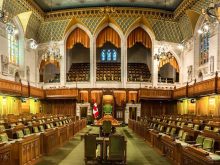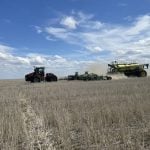Editor’s note, Jan. 30, 2024: This item was written and went to press before Bill C-234 came back up for discussion in the House of Commons on Jan. 29, in consideration of the Senate’s amendments.
Some decades ago my grandmother and I were having a conversation about what I hoped to do in life. If memory serves, I don’t think I yet had a very specific career path in mind and the economy hadn’t yet tanked on Gen-Xers entering the labour market, so having options was still a thing. And my grandmother, bless her heart, suggested I might consider entering politics.
Understand, she didn’t have an agenda in this suggestion; she simply felt the political wing of public service needed good people with an interest in helping others. I don’t recall what I said then, but were it today, and were my grandmother still with us to continue that conversation, I’d probably just offer a very long sigh. I’d soured on party politics long before Bill C-234 was set on the path to death by neglect — but that ill-fated legislation sure reminds me why.
Read Also

Avoid these thought traps when investing
Investing for Fun and Profit: Let’s review a list, by renowned fund manager Peter Lynch, of the most dangerous things that stock market investors can say to themselves, or to others.
As white-collar jobs go, federal politics is tough and all-consuming for those who are any good at it. If you volunteer your time on local boards, think of the worst meeting you had that could have been covered in an email. That seems to me to be all day, every day for parliamentarians, many of whom don’t even get to go home to family at the end of the day — more likely to an Ottawa house or apartment shared with others in the same boat. Then, along with the meetings, greetings and handshakings required for continued public approval, and the handling of calls from (ahem) journalists as well as random participants in today’s ever more extreme and unhinged public discourse, the voice mail and email are bound to be full of messages from constituents who legitimately, often urgently, need their federal representatives’ help.
But I think worse than any of that, though, is having to put in such hard work with nothing to show for it. That’d be like putting up a bumper crop only to have it burst into flames in the bin. Which brings us back to Bill C-234.
If you’re looking for polemics on climate change, or on the merits of a carbon tax as a means to limit use of fossil fuels, look elsewhere. We elect governments to make decisions; this one decided that reducing discretionary use of fossil fuels and accelerating adoption of alternatives was a policy priority, and that carbon pricing would be the best path to that end. The government also rightly recognized “particular groups or sectors” such as farming should get some relief, in part due to “the small number of alternative options they may have in the face of carbon pollution pricing.”
Given the response C-234 received from farm groups — and the absence of pushback when its sunset clause was proposed at the Commons ag committee — it seems clear the bill was intended to correct an oversight, in terms of carbon tax relief. There seemed to be confidence that, while a low-carbon “alternative option” for drying grain — meaning any system more cost-effective than eating the carbon tax on gas-fired dryers — wasn’t yet available, one soon would be. And while historically most private members’ bills are doomed from the start, C-234 had the traction to clear a minority-government Commons (176 ‘yea’ votes out of 322, with the Conservatives, NDP, Bloc and three Liberals in favour).
After all that, the worst part of it wasn’t that the government added new senators to the Red Chamber, right before the Senate voted last month to send an amended version of C-234 back to the Commons. Was that even a surprise? Plumping the Senate with convenient additional members is not unprecedented in Canada — at least, not since 1990, when the Mulroney government first did so to ram through the Goods and Services Tax.
And yes, we know: C-234 is no GST. That’s why most pundits now expect the Senate’s amended version to linger in the Commons like a child’s long-forgotten goldfish, to be found floating in its bowl once the Liberals’ confidence-and-supply agreement with the NDP ends in June next year at the earliest. But that’s not the worst of it.
The worst wasn’t even the government’s move, at the same time, to pause the carbon tax on home heating oil for three years. Some say that carve-out serves only to undermine Canada’s commitment to carbon pricing — and some aren’t wrong. In a weird way, it’s reassuring to know the government is still aware that affordability of heat is a problem especially in non-metro areas of Canada.
What’s worst — and all parties involved bear at least some responsibility for this — is that this bill has been on the books since February 2022. It waited until May for second reading in the Commons and didn’t clear the Commons ag committee until mid-November that year, already far too late to help farmers that fall.
It didn’t clear the Commons until the following March, didn’t clear the Senate ag committee until late last October and didn’t pass third reading until Dec. 12 — again, far too late to be of help to farmers last fall.
So for almost two years C-234 was held out as farmers’ hope to save serious coin on grain drying — that is, unless farmers already had the capital or financing handy to get in on the federal Agricultural Clean Technology Program, which had offered up $50 million in 2021 for 40 per cent cost-shares on equipment to reduce emissions, such as fuel-efficient grain dryers. P.S.: That program’s intake has since closed.
Was it naïve to think C-234 stood a chance? Hindsight says yes, and I count myself among the naïve. Could official Ottawa still pass even the amended version of that bill? Maybe, but don’t bank on it. Could Ottawa put up additional funds to help farmers adopt new grain-drying tech? Also maybe — if the political will is still there. If you’ve got ideas on what to do before next harvest rolls around, we’d love to hear from you.
Just don’t ask me to run for federal office. I’m sure my grandma would understand.
















